-
12 August 1480 – Battle of Otranto: Ottoman troops behead 800 Christians for refusing to convert to Islam; they are later honored in the Church.
1484 –Death of Pope Sixtus IV
1499 – First engagement of the Battle of Zonchio between Venetian and Ottoman fleets.
1503 – Birth of Christian III of Denmark
1566 – Birth of Isabella Clara Eugenia, wife of Albert VII, Archduke of Austria
1570 - Death of Lady Ursula Stafford , daughter of Margaret Pole, Countess of Salisbury, and wife of Henry Stafford, 10th Baron Stafford.
1624 – The president of Louis XIII of France's royal council is arrested, leaving Cardinal Richelieu in the role of the King's principal minister.1311 – Birth of Alfonso XI of Castile
13 August 1382 – Death of Eleanor of Aragon, Queen of Castile

1514 - Marriage of Princess Mary Tudor and King Louis XII by proxy at Greenwich Palace.


Notarial instrument stating that, 13 Aug. 1514, at the royal manor of Greenwich, present Henry VIII., Queen Katharine, the Abp. of Canterbury, Thomas postulate of York, the Dukes of Buckingham, Norfolk and Suffolk, the Bishops of Winchester and Durham, the Marquis of Dorset, the Earls of Shrewsbury, Surrey, Essex and Worcester, John de Selva and Thomas Bohier, appeared the Princess Mary and the Duke of Longueville, and after a Latin speech by the Archbishop and John de Selva, and the reading of the French King's letters patent by the Bp. of Durham, the Duke of Longueville, taking with his right the right hand of the Princess Mary, read the French King's words of espousal (recited) in French. Then the Princess, taking the right hand of the Duke of Longueville, read her part of the contract (recited) in the same tongue. Then the Duke of Longueville signed the schedule and delivered it for signature to the Princess Mary, who signed Marye; after which the Duke delivered the Princess a gold ring, which the Princess placed on the fourth finger of her right hand. Louis XII.'s commission recited (dated St. Germain en Laye 8 Aug. 1514). Attested by Robert Toneys and William Edwardis.The marriage contract of the Princess Mary with Loys duke of Longueville as proxy of Louis XII.
1516 – The Treaty of Noyon between France and Spain is signed. Francis I of France recognizes Charles's claim to Naples, and Charles V, Holy Roman Emperor, recognizes Francis's claim to Milan.

Mary Tudor to Louis XII
Received the letters written with his own hand and heard with great pleasure what the Duke of Longueville said on his behalf. Will love him as cordially as she can. Longueville will relate how all has been concluded. Ends: "de la main de votre humble compagne, MARIE."
1521 – After an extended siege, forces led by Spanish conquistador Hernán Cortés capture Tlatoani Cuauhtémoc and conquer the Aztec capital of Tenochtitlan.
1532 – Union of Brittany and France: The Duchy of Brittany is absorbed into the Kingdom of France.
1533-Chapuys to Charles V.
Instead of giving me an audience, as I wrote, on Sunday the 4th, the King sent a gentleman to me to say that as his physician and some others in the court had been taken by the sweat, he had been compelled to retire to a private house with none but those of his chamber ; but if our charge could only be explained to himself alone, we might have an interview with his Council, who would report to him. This we did, and found them in a house in a park 22 miles from London. They amused us with hunting. We found there only the bishop of Winchester, chief secretary, Cromwell, and the dean of the chapel. They told us that the King was sorry that he had not been able to give us audience, but made his account in taking us hunting and feasting us. We submitted our case touching the innovations with regard to the Staple of Calais, which had been shut, against the custom of the wool trade, asking if this was done by order of the King. Details particulars of the interview, and the reasons they used. Their answer was not final, as the King himself intended to reply by mouth, and Cromwell had undertaken to stay to conduct us to Court ; but as one of Norfolk's servants was come from Lyons he was forced to leave at midnight, telling us not to go to Court until we heard from him.
Following the track of which I wrote to you lately, and finding good opportunities to speak to Cromwell, who sought to converse with me, I proceeded to humour and flatter him, telling him that I often regretted that he had not come to the notice of his master when the Cardinal did ; for as his wit and ability were greater than the Cardinal's, there were a thousand occasions more than now for aggrandising himself, and he would have been a much greater man than the Cardinal, and his master's affairs would have been much better managed. I insisted much upon this, drawing the comparison between the past and the present, and that the King was very fortunate to have got such an excellent servant, considering especially the troubles of the times. Seeing by his face how extremely agreeable this was to him, I passed on to say that now was the time when he might do more service to his master than any man ; for since sentence had been given in favor of the Queen, as he confessed to me, there was no longer any hope of that, which some persons, reckoning without their host, had suggested to the King, his master, viz., that you and the Pope would consent to the divorce ; and it must be thought that the King, being a prince of so much sense and virtue, would not persist in this error, or stain with such an infamy his great gifts of grace and nature. I urged him therefore to persuade the King to return to the right path, which he could do with more credit and authority than any man, as he was now of the King's Council, and was not at the time when this cursed affair was invented ; that the chief hope the Queen had of redressing her affairs rested in him, and if she were restored he would find her a good mistress and better for his purpose than I could tell him. He thanked me much for what I said, assuring me that he and the rest of the Council are well disposed to your Majesty, and he added that he would do all good offices he could, and he hoped all would go well. He did not say, as he used to do, that you and the Queen would do well to consent, and judging from his words, with the long time the King has been away from the Lady, that he has begun to repent. He had told me before that he was to come in two days to London, and we should go hunting together, or wherever else it pleased me ; but as various despatches have arrived from France and Rome, he has not yet had leisure to keep his promise. I lay out all my threads to catch him, always keeping a watchful eye not to adventure myself too far, as I know not whom to trust.
In anticipation of the presumed repentance to which I have alluded, it is probable that, if the Pope refuse to hear the duke of Norfolk and other ambassadors until he have in his power the archbishop of Canterbury and others who have assisted in the sentence, this King will put water in the wine. He finds himself, it is said, in great perplexity from what has been done at Rome, and his Council is very much troubled both at having to send so many despatches to Rome, and also to obviate the censures which the Pope will promulgate ; for which purpose he has already once more projected (de nouveaul jectee) an appeal to the future Council. Another thing "le pacque bien en I'oreille," viz., the interview of the Pope and the king of France ; of which he was formerly very desirous, but now I am told he wishes to hinder it, fearing the Pope will win over the king of France.
The King, desiring peace or truce with the Scots, has granted the points demanded by them, of which I informed your Majesty lately ; and on this Beauvoys despatched one of his servants to the king of Scotland, who returned yesterday. I know not if he will have done anything. At the return of the French ambassador here resident and of Beauvoys, who immediately on the arrival of the said man went to Court, we shall know the truth. The said Scots, as the Scotch ambassador who last returned to France told the King, have not been well pleased at what the French and English kings have published, viz., that peace had been made between them and the English, as nothing had been concluded, and it did not look even probable. It seemed as if they wished to give the world to understand that the king of Scots was under the guidance of one or other of them ; which was enough to make the Scots draw back, whom they hold to be rather savage. "Et ce se paignist" (qu. ce Roy se plaignist?) to the said Ambassador that the Scots in the raids they had made in this kingdom had spread writings in defamation of himself and his subjects, accusing them of tyranny (les intitulant de enterannerie), infidelity, and schism. London, 13 Aug. 1533.
1535-Accusation of Treason.
Information against Sir Gilbarte Rouse, parson of Rouselynch, Worc., by Robt. Wensteley (elsewhere Westeley), laborer, and Harry Englesshe, husbandman, that about three-quarters of a year ago Rouse called the King and his Council "lowlers," on which they immediately informed Sir John Russel, justice of the peace.
The same persons, and Wm. Lenche, of Chirchlenche, say that Nic. Horewell and John Pole told them on Friday, 6 Aug., that Rouse said that the monks and others who were put to death at London were martyrs before God, and saints in Heaven.
ii. Answer of Rouse:—that Westeley told him that, at the market at Evesham, he had heard Cokesey, the under-sheriff, proclaim that tithes were not to be paid till the tiller had sowed his ground, found his house, and paid his debts, and other such regulations. To which he said that if the clergy were so dealt with, they were worse dealt with than Turks or Jews, and as evil as if they were heretics or "lowelers."
As to the second article, he says that within a week after putting the monks and others to death at London, Horewell spoke of it at the cross at Rouselenche; and Rouse said he thought them unfortunate and unwise for taking opinion against the King, and if their opinion had been for the Faith of God they had been martyrs.
iii. Beaudeley, 8 Aug. 27 Hen. VIII. Examination of Robt. Westeley, Henry Englesshe, and Wm. Lynche, the informers.
iv. Beaudeley, 11 Aug. 27 Hen. VIII. Examination of Nic. Horewell and John Pole as to the second article.
v. Beaudeley, 13 Aug. 27 Hen. VIII.
Declaration by Ric. Sheysby, Roger Hybbold, and seven other parishioners of Rouselenche, before the King's commissioners, that they have known Rouse as parson there for 20 years; that he is a good churchman, and they believe him to be a true man to the King, and that he spake no such words. Westeley is a light person and a picker of quarrels.
vi. Statement by Sir John Russell that on the Sunday before the Assumption, 25 Hen. VIII., Robt. Westby (sic) and Horwell laid information against Rouse. Charged him to be ready to testify the same when called upon, but, after hearing the parson's denial, and knowing of old grudge between the parties, respited the matter, and never heard more spoken of it till now of late.
1553 – Michael Servetus is arrested by John Calvin in Geneva, Switzerland as a heretic.

1584 – Birth of Theophilus Howard, 2nd Earl of Suffolk, English admiral and politician ,son of Thomas Howard, 1st Earl of Suffolk, by his second wife, Catherine Knyvet of Charlton

source:http://www.british-history.ac.uk/,wikipedia
-
11 August 1332 – Wars of Scottish Independence: Battle of Dupplin Moor – Scots under Domhnall II, Earl of Mar are routed by Edward Balliol.
1467 – Birth of Mary of York ,second daughter of Edward IV and his queen consort Elizabeth Woodville.She was a younger sister of Elizabeth of York and an older sister of Cecily of York, Edward V of England, Margaret Plantagenet (Princess of York), Richard of Shrewsbury, 1st Duke of York, Anne of York, George Plantagenet, Duke of Bedford, Catherine of York and Bridget of York.Little is known about the second York princess except that she was born in Windsor Castle, and one of her sponsors was Cardinal Bourchier. There were reportedly plans to marry her to Hans (heir and future King of Denmark, Norway, and Sweden) but nothing came of them; Hans married Christina of Saxony in 1478.
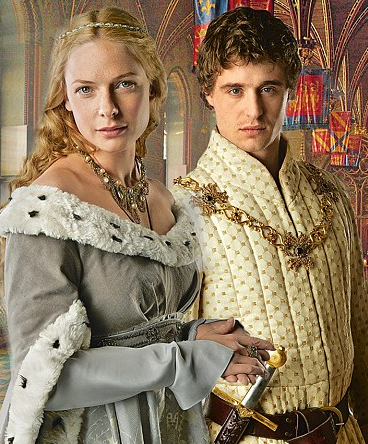
1513-James IV's defiance
The 11 day of August, 1513, the King being in his rich tent, the herald of the King of Scots was brought to him and gave his message (recited) that, having now besieged Turwyn two months without being fought with and having, by his invasion, caused the King of France to recal his army from Milan, Henry should be content and return home without making further war. "The King, standing still with sober countenance, having his hand on his sword, said 'Have ye now your tale at an end?' The herald of arms said 'Nay.' 'Say forth then,' said the King. 'Sir, he summoneth your Grace to be at home in your realm in the defence of his ally.' Then the King answered and said 'Ye have well done your message; nevertheless it becometh ill a Scot to summon a King of England. And tell your master that I mistrust not so the realm of England but he shall have enough to do whensoever he beginneth; and also I trusted not him so well but that I provided for him right well, and that shall he well know. And he to summon me, now being here for my right and inheritance! It would much better agreed with his honour to have summoned me being at home; for he knew well before my coming hither that hither would I come. And now to send me summons! Tell him there shall never Scot cause me to return my face. And where he layeth the French King to be his ally it would much better agreed and become him, being married to the King of England's sister, to recount the King of England his ally. And now, for a conclusion, recommend me to your master and tell him if he be so hardy to invade my realm or cause to enter one foot of my ground I shall make him as weary of his part as ever was man that began any such business. And one thing I ensure him by the faith that I have to the Crown of England and by the word of a King, there shall never King nor Prince make peace with me that ever his part shall be in it. Moreover, fellow, I care for nothing but for misentreating of my sister, that would God she were in England on a condition she cost the Schottes King not a penny.' The herald answered and said 'If your grace would give her your whole realm she would forsake it to be entreated as she is.' The King said 'I know the contrary and know what all this matter meaneth; the King your master has [been?] anointed with the crowns of the sun, but I trust ere it be long the French King shall have enough to do to keep his crowns for himself.'"

1534 - The Friars Observant evicted from their religious house due to their support of Catherine of Aragon and their refusal to accept the King’s supremacy.
1534- Chapuys to Charles
The day after the date of my last the Scotch ambassador came to dine with me, and besides confirming what he had sent to tell me by my man, said many things tending to show the singular affection and confidence his king and realm had in your majesty. He gave me to understand that neither his master nor the kingdom was much disappointed at not having the daughter of France, hoping to make alliance with your majesty, which is the thing they always have desired most, although they have not been able to declare it hitherto on account of their treaty with France, and that the king of France had hitherto excused himself by the age of his daughter, but that now, when that excuse no longer availed, the King his master had shown to the French ambassador the treaties and made the requisite protestations, “quilz remeunent, car soubdainement il en vouloit envoyer a vostre majeste.” I held favorable language to him generally, and coming to the matter of the marriage pointed out the great good it would be if his master tried to obtain the Princess; which he acknowledged, if there were any hope of success. He said also, that at his departure from the King his master's court, there was no news of the person sent by your majesty, nor of the movements in Ireland, which might open the eyes of their men, especially one of their earls, who is one of the nearest to Ireland, and one of the most warlike lords in Scotland, having under him at all times Wild Scots who are friends of the said Irish. He could not tell me if the King his master had any intelligence with the said Irish, although he thought he had. He also said that when peace was last treated of, the commissioners of this king had proposed that his master should renounce the right he claimed in Ireland, but it was not listened to. Among other news brought by the bishop who last came from Ireland, it is mentioned that the archbishop of Dublin, chancellor of Ireland, was going to cross the Channel, when, the wind being contrary, he was driven back to some port where, as there was a fortress, he expected to be in security, but he and all his company fell into the hands of Kildare's son and his adherents, and to avoid trouble and expense he was put to death, with all his company, except two persons, who are thought to be the wealthiest of that country, and who paid a ransom. An Irishman has also told me that the said Kildare had taken four or five towns. The King, as I know from good authority, has not for a long time been so much troubled as by the news brought by the said bishop, to whom Cromwell utters a thousand reproaches, charging him with treason for leaving Ireland at a time when the Irish ought to be maintained in loyalty and obedience to the King, and moreover, when his departure might give rise to many surmises and scandals. I am told he keeps the said bishop under arrest, I know not whether to punish him or to prevent the news being made public. Three days after the said bishop's arrival, Skeffington, the deputy of Ireland, left with his train to go thither, and next day the vessel with the artillery set sail. Many think the said Deputy and ship will not escape the hands of the enemies. It seems as if the King wishes to destroy Ireland, as he does not make provision of men, and sends such a governor who is the most incompetent for such a charge that could be chosen. It is said that the same Kildare has a following of 20,000 men, and that more come to him every day, and that even from Wales and Scotland there have come some; which would be a great thing if it were so, but he ought to help your majesty and his Holiness, of which I have twice written to Cifuentes, in order that he may show his Holiness that all this is done in behalf of the faith and of the Holy See.
Eight days ago there was sent thither a copy of a letter written from Rome on 26th ult., addressed to the French king, stating that the Pope had, 12 days previously, been so ill that he had declined all business except touching the preparation of his soul, and after the King's council and the ambassador of France had discussed the matter two days, the said ambassador and Cromwell despatched a courier in all haste to Rome, although they have spread a report that he was not going beyond Lyons, and today Gregory de Casal is to leave to follow the said courier in post and from Rome to go to Venice. Nothing is known of their charge. I cannot find out that those of Lubeck have treated anything here except matters relating to the faith, unless perhaps they have asked money to restore king Christiern to Denmark. The Venetian ambassador came to me yesterday and asked what order had been taken that Venetian merchants might obtain wool from Spain, since those here make a difficulty about it, besides illtreating the merchants. He told me besides that he had written to Venice, advising strongly that they should pass such an edict as was lately made in France, as I wrote to your majesty in my last. I spoke to him encouragingly, and he left well pleased.
Of seven houses of Observants, five have been already emptied of friars, because they have refused to swear to the statutes made against the Pope. Those in the two others expect also to be expelled. London, 11 Aug. 1534.
1553 - Queen Mary has a requiem mass held for King Edward

1596 – Death of Hamnet Shakespeare, son of William Shakespeare
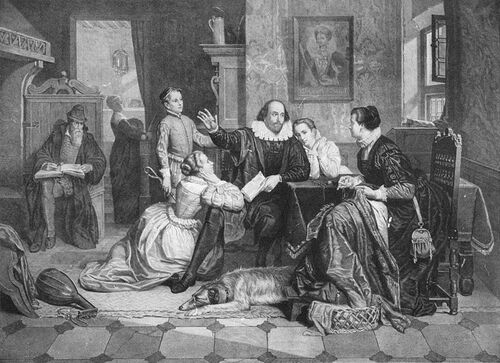
source:http://www.thetudorswiki.com/,wikipedia,http://www.british-history.ac.uk/
-
09 August 1483 – Opening of the Sistine Chapel in Rome with the celebration of a Mass.
1561 - Elizabeth I declared that bishop's and university fellows' wives could not live in the colleges or cathedral churches.

1588-Speech to the Troops at Tilbury
The Speech to the Troops at Tilbury was delivered on 9 August 1588 by Queen Elizabeth I to the land forces earlier assembled at Tilbury in Essex in preparation for repelling the expected invasion by the Spanish Armada.
Prior to the speech the Armada had been driven from the Strait of Dover in the Battle of Gravelines eleven days earlier, and had by then rounded Scotland on its way home, but troops were still held at ready in case the Spanish army of Alexander Farnese, the Duke of Parma, might yet attempt to invade from Dunkirk; two days later they were discharged. On the day of the speech, the Queen left her bodyguard before the fort at Tilbury and went among her subjects with an escort of six men. Lord Ormonde walked ahead with the Sword of State; he was followed by a page leading the Queen's charger and another bearing her silver helmet on a cushion; then came the Queen herself, in white with a silver cuirass and mounted on a grey gelding. She was flanked on horseback by her Lieutenant General the Earl of Leicester on the right, and on the left by the Earl of Essex, her Master of the Horse. Sir John Norreys brought up the rear.
"My loving people
We have been persuaded by some that are careful of our safety, to take heed how we commit our selves to armed multitudes, for fear of treachery; but I assure you I do not desire to live to distrust my faithful and loving people. Let tyrants fear. I have always so behaved myself that, under God, I have placed my chiefest strength and safeguard in the loyal hearts and good-will of my subjects; and therefore I am come amongst you, as you see, at this time, not for my recreation and disport, but being resolved, in the midst and heat of the battle, to live and die amongst you all; to lay down for my God, and for my kingdom, and my people, my honour and my blood, even in the dust.
I know I have the body of a weak, feeble woman; but I have the heart and stomach of a king, and of a king of England too, and think foul scorn that Parma or Spain, or any prince of Europe, should dare to invade the borders of my realm; to which rather than any dishonour shall grow by me, I myself will take up arms, I myself will be your general, judge, and rewarder of every one of your virtues in the field.
I know already, for your forwardness you have deserved rewards and crowns; and We do assure you on a word of a prince, they shall be duly paid. In the mean time, my lieutenant general shall be in my stead, than whom never prince commanded a more noble or worthy subject; not doubting but by your obedience to my general, by your concord in the camp, and your valour in the field, we shall shortly have a famous victory over these enemies of my God, of my kingdom, and of my people."
10 August 1316 – The Second Battle of Athenry takes place near Athenry during the Bruce campaign in Ireland.
The Bruce campaign was a three-year military campaign by Edward Bruce, brother of the Scottish king Robert Bruce, in Ireland. It lasted from his landing at Larne in 1315 to his defeat and death in 1318 at the Battle of Faughart in County Louth.
After his victory at the Battle of Bannockburn, Robert decided to expand his war against the English by sending an army under his younger brother Edward to invade Ireland. Another reason for the expedition was also the fact that supporters of the exiled House of Balliol had fled to Ireland after fighting at Bannockburn and remained a dangerous threat. These men were led by John MacDougall of Lorn who was the cousin of John III Comyn, Lord of Badenoch, nephew of King John Balliol. The murder of Comyn in 1306 had set off a bloody civil war for the throne of Scotland which King Robert had all but won at Bannockburn and was now attempting to finish off by capturing their last remaining stronghold. Robert was also invited by some of the native Irish to send an army to drive out the Norman settlers and in return they would crown his brother High King of Ireland. This campaign to revive the High Kingship effectively ended with Edward's defeat and death in the Battle of Faughart in 1318.
1489 – Birth of Jacob Sturm von Sturmeck, German politician
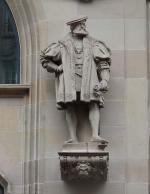
1512-Death of Sir Thomas Knyvett
Sir Thomas Knyvett was a young English nobleman who was a close associate of King Henry VIII shortly after that monarch came to the throne. According to Hall's Chronicle,[Knyvett was a frequent participant in the jousts and pageants of the new king's glittering court and was made Henry's Master of the Horse in 1510.
When Henry declared war on France in 1512, Knyvett, along with Sir John Carew, was given command of the royal flagship, the Regent. With a number of court favourites commanding other vessels, a small fleet set sail for the coast of Brittany. On 10 August 1512 they engaged a slightly larger French fleet, and a violent melee known as the Battle of St. Mathieu ensued off the coast of Brest. Knyvett's ship grappled with the Breton command vessel Cordelière, and was engaged in boarding her when the Cordelière's powder magazine blew up (some say it was deliberately ignited). The two vessels burst into flame. Knyvett and Carew both perished, along with the Breton captain Hervé de Portzmoguer and more than 1,700 men, both French and English.

1512 – The naval Battle of Saint-Mathieu, during the War of the League of Cambrai, sees the simultaneous destruction of the Breton ship La Cordelière and the English ship The Regent.
The naval Battle of Saint-Mathieu took place on 10 August 1512 during the War of the League of Cambrai, near Brest, France, between an English fleet of 25 ships commanded by Sir Edward Howard and a Franco-Breton fleet of 22 ships commanded by René de Clermont. It is possibly the first battle between ships using cannon through ports, although this played a minor role in the fighting.This was one of only two full-fledged naval battles fought by King Henry VIII's Navy Royal.During the battle, each navy's largest and most powerful ship—Regent and Marie-la-Cordelière (or simply Cordelière)—was destroyed by a large explosion aboard the latter.
1519 – Ferdinand Magellan's five ships set sail from Seville to circumnavigate the globe. The Basque second in command Juan Sebastián Elcano will complete the expedition after Magellan's death in the Philippines.
1520 – Birth of Madeleine of Valois

1535 – Death of Ippolito de' Medici, Florence ruler
1553 - Queen Mary holds an obsequy for King Edward
1557 – Battle of St. Quentin: Spanish victory over the French in the Habsburg-Valois Wars.
The Battle of Saint-Quentin of 1557 was fought at Saint-Quentin in Picardy, during the Italian War of 1551–1559. The Spanish, which is to say the international forces of the Habsburg Philip II of Spain, who had regained the support of the English whose Catholic queen he had married, won a significant victory over the French at Saint-Quentin, in northern France
source:wikipedia,the tudors wiki
-
8 August 1503 – King James IV of Scotland marries Margaret Tudor, daughter of King Henry VII of England at Holyrood Abbey in Edinburgh, Scotland.
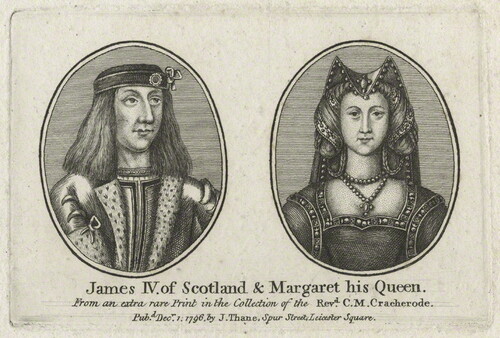
1533- Henry VIII. to Norfolk and Rochford
Had written to him by lord Rochford what arguments he should use to dissuade the French king from meeting the Pope. Suggests further to the same effect that he should urge the inconsistency of the French king's doing so, as he promised that if the Pope took any new steps against his brother he would not meet him. If he denies he made such a promise you shall lament your misfortune in having told us that he had. If he admits it, but thinks this is no innovation, you shall exclaim, "How hard it is that one of my age and place should be invited to your interview with the Pope, and yet 'understand such matter' whereupon neither my master's honor nor my heart will allow me to be present. Occasion will rather be given by my departure to blow abroad the small appearance of friendship between the two Crowns. Irreparable injury will ensue by this meeting, and the opinion of the world, often stronger than truth, will be lost." If he urges that princes must use policy, and pretends that what he is doing is for our benefit, you shall urge that the Pope has treated us with great injustice, that what we have done has been with the French king's advice, and that the Pope has injured us both ; that his citation of us to Rome is a manifest wrong to all princes, in which he still perseveres, notwithstanding the remonstrance of the Cardinals sent by the French king. On consulting him by you lord Rochford how to disclose our marriage, he advised us to knit the nobles of our realm in one accord, and then divulge it ; and as there was no other way so firm to knit them as by Parliament, "all other knots being loose and slippery, this knot of act and statute is by authority thereof permanent and durable, and he ought to be contented now that it is a sure knot, and that we have attempted no innovation of which he was not the substantial author." Therefore, if the Pope persists in proceeding against us, no good can come from his interview with the French king.
To all his attempts to revoke what is done here, we shall say Nay, in such a sort that the world shall hear and the Pope shall feel it. We therefore put our trust in him, and think it would be dishonorable in him to see decay a thing that was of his own foundation, most so to us who have now come to harvest, and trust shortly to see the fruit of our marriage. You shall further say that you know that our determination is fixed, and that we will not allow our marriage, the sentence of the archbishop of Canterbury, the statutes of our realm, or our late proclamation to be touched. Therefore let him make no promise to the Pope in these matters. If he would tell the Pope that unless he make us amends he can have no further amity with him, this will be an honorable course, and induce him and other princes to make our cause their own. If, to remove all suspicion of our amity, he brake off the appointed meeting with the Emperor, there is much greater reason to break off this meeting with the Pope. If you can persuade him to this you are to tarry with him, and consult by what ways and means we can best annoy the Pope. If you cannot, and he urges that it is important for him to have the Duchess in his hands, you shall tell him that you remember he once said he would never conclude that marriage except to do us good, but you cannot prevent him, and therefore only lament the necessity of your returning to England, for you cannot look patiently on your master's enemy. And you shall further signify that we have commissioned Sir Fras. Brian and Sir John Wallop to repair with him to the interview, provided they never present themselves to the Pope. In taking leave of him you shall say that if he will needs meet the Pope he can do nothing so acceptable to you as to persuade the Pope to pronounce the marriage of the lady Katharine null and void.

1535-Katherine of Arragon to Queen Mary of Hungary.
Not to trouble her Highness, has forborne to reply to the letters she lately wrote, but is compelled by the offence given here to God, the danger of her husband's conscience, and the scandal to Christendom, to implore the persons who can help to remedy it. Is informed that there is to be a meeting shortly between her Highness and the queen of France, and, hoping that some good may be done at that time, begs her earnestly for two things; first, to inform the Emperor of the extreme urgency of the matters of this kingdom; and, secondly, when she sees the Queen her sister, to beg of her, with Katharine's recommendations, to use her influence with the King her husband to be a good friend to Henry in getting him to abandon the sin in which he stands. Knows well her Highness is in much trouble seeing his Majesty is in lands so remote. Is troubled at it herself, but restrains herself with the thought that he is engaged in a holy cause in spreading the Christian religion. Hopes, therefore, that God will give him the victory and health to his kingdoms. Thanks Mary for her good offices. Kimbolton
1553 - King Edward VI buried with Protestant rites

1560 – Birth of Elizabeth Báthory, Hungarian murderer
1576 – The cornerstone for Tycho Brahe's Uraniborg observatory is laid on Ven, Denmark.

1585 – John Davis enters Cumberland Sound in search of the Northwest Passage.

1588 – Anglo-Spanish War: Battle of Gravelines – The naval engagement ends, ending the Spanish Armada's attempt to invade England.
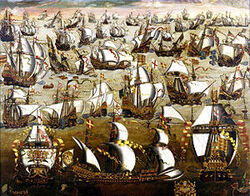
1605 – The city of Oulu, Finland, is founded by Charles IX of Sweden.
1605 – Birth of Cecilius Calvert, 2nd Baron Baltimore, English lawyer and politician
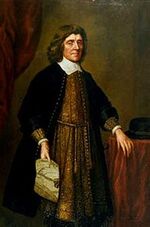
source:http://www.british-history.ac.uk/,wikipedia
-
07 August 936 – Coronation of King Otto I of Germany.
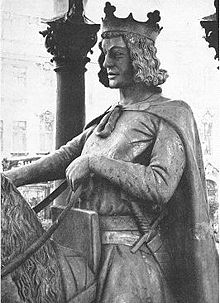
1106 – Death of Henry IV, Holy Roman Emperor

1420 – Construction of the dome of Santa Maria del Fiore begins in Florence.

1427 – The Visconti of Milan's fleet is destroyed by the Venetians on the Po River.
1461 – The Ming Dynasty Chinese military general Cao Qin stages a coup against the Tianshun Emperor.
1485 – Death of Alexander Stewart, Duke of Albany
1514 -King Henry VIII of England concludes an independent peace treaty with France in the War of the League of Cambrai, negotiated by Thomas Wolsey.The War of the League of Cambrai, sometimes known as the War of the Holy League and by several other names,was a major conflict in the Italian Wars. The principal participants of the war, which was fought from 1508 to 1516, were France, the Papal States and the Republic of Venice; they were joined, at various times, by nearly every significant power in Western Europe, including Spain, the Holy Roman Empire, England, Scotland, the Duchy of Milan, Florence, the Duchy of Ferrara, and Swiss mercenaries.Pope Julius II, intending to curb Venetian influence in northern Italy, had created the League of Cambrai, an anti-Venetian alliance that included, besides himself, Louis XII of France, Holy Roman Emperor Maximilian I and Ferdinand II of Aragon. Although the League was initially successful, friction between Julius and Louis caused it to collapse by 1510; Julius then allied himself with Venice against France.The Veneto–Papal alliance eventually expanded into the Holy League, which drove the French from Italy in 1512; disagreements about the division of the spoils, however, led Venice to abandon the alliance in favor of one with France. Under the leadership of Francis I, who had succeeded Louis to the throne, the French and Venetians would, through their victory at Marignano in 1515, regain the territory they had lost; the treaties of Noyon and Brussels, which ended the war the next year, would essentially return the map of Italy to the status quo of 1508.


1514-Engagement of L. d'Orleans, John de Selva, and T. Bohier, on part of Louis XII., to pay one million of gold crowns to Henry VIII.
1514-Treaty of marriage between Louis XII. and the Princess Mary.

1514-Bishop of Worcester to Wolsey
In the marriage contract with the French the Pope desires that he should be mentioned with honor, as he was the first to propose it to France and England, and he desires that the former should be aware of their obligation. If the friendship between Henry VIII. and the King Catholic endure it will be easy to bridle the inconstancy of the French. The Pope is displeased that he has received no notice from England of this affair, although the French have bragged for the last eight days that the marriage has been concluded. They say the same of the treaty, which ought not to have been divulged, to make it appear that the Swiss have been abandoned by England. As to the treaty of which [Wolsey] has sent the writer a copy of the articles which he believes will be concluded, the Pope is pleased with it, but does not think it proper that the Swiss should be expressly mentioned. Sends a copy of a note received from his Holiness of points he wishes inserted. If this is done it will bind his Holiness to grant the legation, if not for life, at least in prorogation. Once again reminds him that in the marriage and treaty all regard should be had for the Pope's honour.
1549 - Mary, Queen of Scots sails for France

1560 – Birth of Elizabeth Báthory, Hungarian serial killer
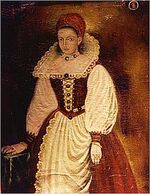
1571 – Birth of Thomas Lupo, English viol player and composer
1574 – Birth of Robert Dudley.He was an English explorer and cartographer. In 1594, he led an expedition to the West Indies, of which he wrote an account.
He was the illegitimate son of Robert Dudley, 1st Earl of Leicester, he inherited the bulk of the Earl's estate in accordance with his father's will, including Kenilworth Castle. In 1603–1605 he tried unsuccessfully to establish his legitimacy in court. After that he left England forever, finding a new existence in the service of the Grand Dukes of Tuscany. There he worked as an engineer and shipbuilder and designed and published Dell'Arcano del Mare, the first maritime atlas to cover the whole world. He was also a skilled navigator and mathematician. In Italy he styled himself "Earl of Warwick and Leicester", as well as "Duke of Northumberland", a title recognized by the Emperor Ferdinand II.
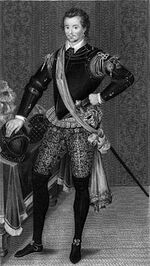
1613 – Death of Thomas Fleming, English judge and politician, Lord Chief Justice of England

source:wikipedia,http://www.british-history.ac.uk/





